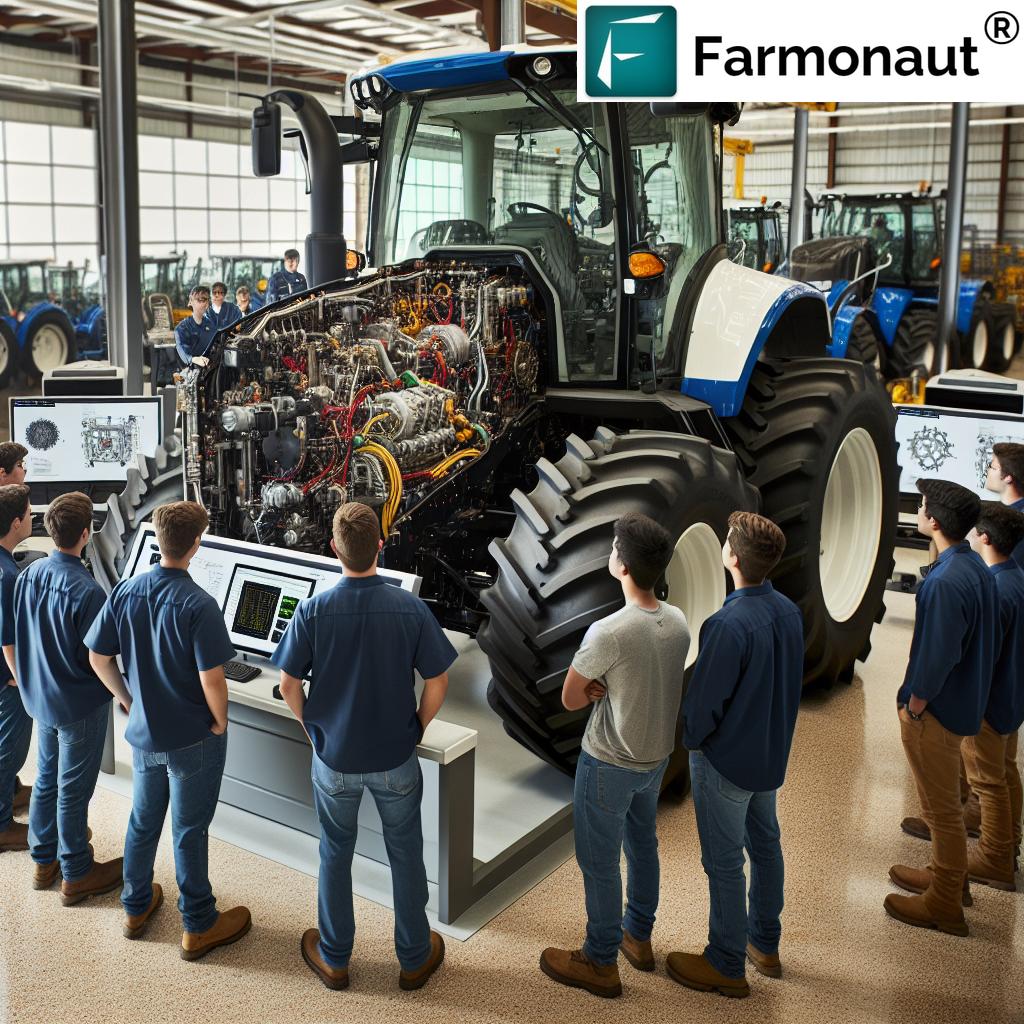Unlocking Agricultural Success: How Farmonaut’s Tech Programs Revolutionize Farm Equipment Maintenance in Texas
“Texas agricultural equipment technician programs offer over 1000 hours of hands-on training in precision farming technologies.”
In the heart of the Lone Star State, a revolution is taking place in the world of agricultural technology. As we at Farmonaut continue to push the boundaries of precision agriculture, we’re excited to explore how Texas is leading the charge in transforming farm equipment maintenance through cutting-edge technician training programs. These initiatives are not just changing the face of farming; they’re creating a new generation of skilled professionals ready to tackle the challenges of modern agriculture.
Let’s dive into the world of agricultural equipment technician training and discover how these programs are shaping the future of farming technology in Texas and beyond.
The Evolution of Agricultural Equipment Maintenance
Gone are the days when a wrench and a bit of elbow grease were all you needed to keep farm equipment running. Today’s agricultural machinery is a complex blend of mechanical engineering and high-tech electronics. This evolution has created a pressing need for technicians who are as comfortable with computer diagnostics as they are with hydraulic systems.
In Texas, vocational schools and technical colleges have risen to the challenge, developing comprehensive curricula that prepare students for the multifaceted world of modern farm equipment maintenance. These programs are designed to equip technicians with the skills needed to service, repair, and optimize the sophisticated machinery that powers modern agriculture.

The Curriculum: A Blend of Tradition and Innovation
Agricultural equipment technician training programs in Texas offer a robust curriculum that covers a wide range of topics. Here’s what aspiring technicians can expect to learn:
- Hydraulic Systems: Understanding the principles and maintenance of hydraulic components in tractors and other farm machinery.
- Powertrains: Mastering the complexities of modern transmission systems and drive trains.
- Electrical Components: Gaining expertise in the electrical systems that power today’s smart farming equipment.
- Precision Agriculture Technician Skills: Learning to work with GPS-guided systems, yield monitors, and other high-tech farming tools.
- Farm Equipment Diagnostic Techniques: Developing the ability to troubleshoot and diagnose issues using computer-based tools.
- Safety Procedures: Emphasizing the importance of safety in all aspects of equipment operation and maintenance.
These programs blend classroom learning with extensive hands-on experience, ensuring that graduates are well-prepared for the challenges they’ll face in the field.
Hands-On Training: The Core of Technician Education
One of the hallmarks of Texas’s agricultural equipment technician programs is their emphasis on practical, hands-on training. Students spend hundreds of hours working directly with the same types of machinery they’ll encounter in their future careers. This approach not only builds technical skills but also instills confidence and problem-solving abilities that are crucial in the field.
Many programs in Texas have partnerships with leading agricultural equipment manufacturers, providing students access to the latest machinery and diagnostic tools. This exposure ensures that graduates are familiar with current technology and prepared for the rapid pace of innovation in the industry.
Diesel Technician Certification Programs: A Pathway to Success
Within the broader field of agricultural equipment maintenance, diesel technician certification programs play a crucial role. These specialized courses focus on the powerful engines that drive most farm machinery. In Texas, several institutions offer diesel technician certifications that are highly valued in the agricultural sector.
These programs cover:
- Advanced diesel engine repair and maintenance
- Fuel systems and emissions control
- Heavy-duty brake systems
- Electronic engine management
Graduates of these programs often find themselves in high demand, with opportunities at dealerships, independent repair shops, and large farming operations across the state and beyond.
“Graduates from farm equipment maintenance programs see a 95% job placement rate within 6 months of completion.”
Off-Road Equipment Repair: A Specialized Skill Set
Agricultural machinery often operates in challenging conditions, far from paved roads and controlled environments. This reality necessitates a specialized approach to equipment repair and maintenance. Texas’s technical programs recognize this need and include focused training on off-road equipment repair techniques.
Students learn to:
- Navigate difficult terrain for on-site repairs
- Perform field diagnostics with limited resources
- Implement temporary fixes to keep equipment operational during critical times
- Understand the unique wear patterns and stress points of off-road machinery
This specialized knowledge is invaluable in Texas’s diverse agricultural landscape, from the flat plains to the rugged hill country.
The Role of Technology in Modern Farm Equipment
As we at Farmonaut understand well, technology is revolutionizing every aspect of agriculture, including equipment maintenance. Texas’s training programs are at the forefront of this technological integration, incorporating cutting-edge tools and techniques into their curricula.
Some of the advanced technologies covered include:
- Telematics for remote diagnostics and monitoring
- Augmented reality (AR) for complex repair procedures
- 3D printing for rapid prototyping and parts fabrication
- Machine learning algorithms for predictive maintenance
By familiarizing students with these technologies, Texas’s programs ensure that the next generation of technicians is prepared to work with the farm equipment of today and tomorrow.

Internships and Industry Partnerships: Bridging Education and Employment
A key component of Texas’s successful technician training programs is their strong relationships with industry partners. Many schools offer internship opportunities that allow students to gain real-world experience before graduation. These internships often lead to full-time employment, creating a smooth transition from education to career.
Industry partnerships also benefit the programs themselves, ensuring that curricula remain relevant and up-to-date with the latest industry trends and technologies. Equipment manufacturers and dealerships often provide input on course content, donate machinery for training purposes, and offer guest lectures from experienced professionals.
Continuing Education: Staying Ahead in a Rapidly Evolving Field
The world of agricultural technology is constantly evolving, and Texas’s technician training programs recognize the importance of lifelong learning. Many institutions offer continuing education courses and workshops for practicing technicians, helping them stay current with new technologies and repair techniques.
These ongoing educational opportunities cover topics such as:
- Updates to emissions control systems
- New diagnostic software and tools
- Emerging precision agriculture technologies
- Advanced hydraulic and electrical system repairs
By promoting a culture of continuous learning, Texas ensures that its agricultural equipment technicians remain at the forefront of their field throughout their careers.
The Economic Impact of Skilled Technicians in Texas Agriculture
The importance of well-trained agricultural equipment technicians extends far beyond the repair shop. These skilled professionals play a crucial role in maintaining the efficiency and productivity of Texas’s vast agricultural sector. By keeping farm machinery in optimal condition, technicians help reduce downtime, increase crop yields, and ultimately contribute to the state’s economic prosperity.
Moreover, the high demand for qualified technicians has created a robust job market with competitive salaries and excellent career prospects. This not only benefits individual technicians but also helps to sustain rural communities across Texas by providing stable, well-paying jobs.
Comparative Analysis of Texas Agricultural Equipment Technician Programs
To help aspiring technicians make informed decisions about their education, we’ve compiled a comparison of some of the top agricultural equipment technician training programs in Texas:
| Program Name | Location | Duration | Specializations Offered | Hands-on Training Hours | Internship Opportunities | Certification Options | Job Placement Rate | Average Starting Salary |
|---|---|---|---|---|---|---|---|---|
| Texas A&M AgriTech Institute | College Station | 2 years | Precision Agriculture, Hydraulics, Powertrains | 1200 | Yes | ASE, John Deere Tech | 97% | $45,000 |
| Lone Star College – Agricultural Mechanics | Houston | 18 months | Diesel Technology, Electrical Systems | 1000 | Yes | ASE, EETC | 95% | $42,000 |
| Tarleton State University – Agricultural Services and Development | Stephenville | 4 years (Bachelor’s) | Farm Management, Agricultural Mechanics | 1500 | Yes | CNHA, AED | 98% | $48,000 |
| South Plains College – Diesel Service Technology | Levelland | 2 years | Heavy Equipment, Fuel Systems | 1100 | Yes | ASE, Cummins | 93% | $40,000 |
| Texas State Technical College – Agricultural Technology | Waco | 2 years | Precision Farming, GPS Technology | 1300 | Yes | CNHA, Trimble | 96% | $44,000 |
This comparison highlights the diversity of options available to aspiring technicians in Texas, from focused two-year programs to comprehensive four-year degrees. Each program offers unique specializations and industry connections, allowing students to choose the path that best aligns with their career goals.
The Future of Agricultural Equipment Maintenance in Texas
As we look to the future, it’s clear that the role of agricultural equipment technicians will only grow in importance. With the increasing adoption of precision agriculture technologies, autonomous machinery, and data-driven farming practices, the need for highly skilled technicians will continue to rise.
Texas’s training programs are well-positioned to meet this growing demand, continuously adapting their curricula to incorporate emerging technologies and techniques. As the agricultural sector evolves, so too will the skills and knowledge required of its technicians.
Farmonaut’s Perspective on Agricultural Technology Education
At Farmonaut, we recognize the critical role that skilled technicians play in the agricultural ecosystem. Our satellite-based farm management solutions complement the work of these professionals, providing valuable data and insights that help optimize equipment performance and farm productivity.
We believe that the integration of advanced technologies like those offered by Farmonaut into technician training programs can further enhance the capabilities of future agricultural professionals. By understanding both the mechanical aspects of farm equipment and the data-driven insights provided by precision agriculture tools, technicians can offer more comprehensive support to farmers and agricultural businesses.
For those interested in exploring Farmonaut’s innovative agricultural solutions, we invite you to check out our platforms:
For developers interested in integrating our technology into their own solutions, we offer a robust API:
Conclusion: A Bright Future for Agricultural Equipment Technicians in Texas
The agricultural equipment technician training programs in Texas are more than just educational initiatives; they’re catalysts for innovation and sustainability in the agricultural sector. By equipping the next generation of technicians with a blend of traditional mechanical skills and cutting-edge technological knowledge, these programs are ensuring that Texas remains at the forefront of agricultural innovation.
For those considering a career in this dynamic field, the opportunities are abundant and rewarding. With high job placement rates, competitive salaries, and the satisfaction of playing a crucial role in feeding the world, agricultural equipment technicians are truly the unsung heroes of modern farming.
As we at Farmonaut continue to push the boundaries of what’s possible in precision agriculture, we’re excited to see how the skilled technicians trained in Texas will leverage these technologies to drive the future of farming. Together, we’re building a more efficient, sustainable, and productive agricultural landscape for generations to come.
FAQs about Agricultural Equipment Technician Training in Texas
- Q: What are the basic requirements to enroll in an agricultural equipment technician program in Texas?
A: Most programs require a high school diploma or equivalent, basic math and reading skills, and sometimes a valid driver’s license. Some may also require a background check and drug screening. - Q: How long does it typically take to complete an agricultural equipment technician program?
A: Programs can range from 18 months to 4 years, depending on whether it’s a certificate, associate’s degree, or bachelor’s degree program. - Q: What kind of job opportunities are available after completing a program?
A: Graduates can find employment at equipment dealerships, independent repair shops, large farms, and agricultural equipment manufacturers. Some may also choose to start their own repair businesses. - Q: Are there opportunities for advancement in this field?
A: Yes, technicians can advance to roles such as shop foreman, service manager, or even move into sales or training positions within equipment dealerships or manufacturers. - Q: How does the integration of precision agriculture technologies affect the job of an equipment technician?
A: Technicians now need to be proficient in working with GPS systems, yield monitors, and other high-tech components. This has expanded the skill set required but also created new opportunities for specialization.
















